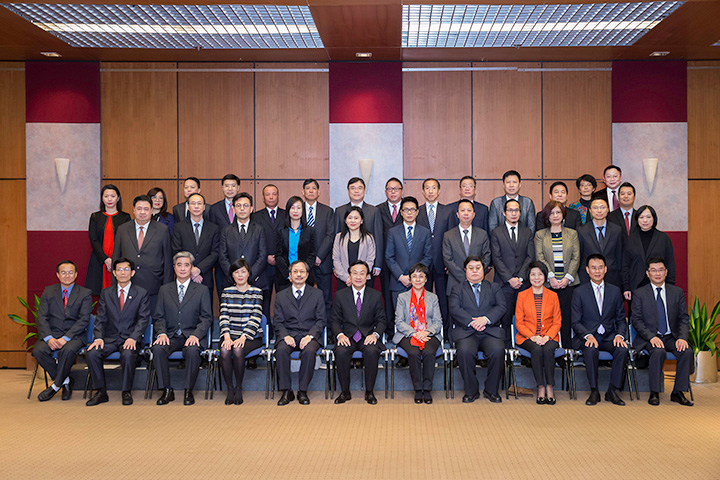Government to Optimise Individual Visit Scheme Policy

Secretary for Social Affairs and Culture with Tourism Development Committee members at first Plenary Session of 2015
Macau's Secretary for Social Affairs and Culture, Alexis Tam, has announced that rather than contemplating a cap on Mainland tourists the Macau Government is discussing measures with the central government to “control and optimise" Macau's increasingly large tourist influx. The tactics adopted will revolve around channelling tourist flow between different border crossings in addition to optimising the Individual Visit Scheme.
On the sidelines of the Tourism Development Committee's first meeting this year, held last February, the Secretary said: “We don't want to implement a cap on [Mainland] tourists. We need to optimise the number of tourists using individual visas. And we also need to discuss with Guangdong authorities how to co-ordinate and divide tourist flow between different borders."
Mr. Tam acknowledged that the growing number of Chinese visitors has put pressure on Macau residents' daily life and mobility, while at the same time recognising that “we have a growing number of tourists coming from China and of course companies want this. If I were an entrepreneur I would want the same because more tourists equals more business."
He stressed that the 31.5 million tourists recorded last year is adequate. The possibility of accommodating Mainland tourists at different times of the year, alleviating the pressure felt in Macau on popular public holidays like the 'Golden Weeks' of Chinese New Year, National Day, and other national public holidays, has been mooted but Macau's executive, he says, “will first discuss this matter with the central government" in Beijing.
Any policy, he stressed, is to be implemented progressively and will take into account existing infrastructure, hinting that the optimisation of the tourist influx policy could be adjusted according to the situation.
During the Tourism Development Committee meeting, Maria Helena de Senna Fernandes, Director of the Macau Government Tourist Office, said: “At this moment, we need to find ways to improve our situation. In the future, when we have more infrastructure and developments, we can re-consider [whether we can cope with more tourists visiting Macau]. Maybe we will be able to have a higher capacity when we have more infrastructure."
Another topic tackled by members of the Tourism Development Committee was that of improving Macau's tourism quality. Several members stressed that it is important to ensure residents' quality of life, with suggestions ranging from the popular audiovisual mapping of St Paul's Ruins being organised at other historical sites to attracting tourists to different parts of the city to encouraging non-Chinese tourists to visit Macau, namely from the Middle East, Russia and Europe.
Macau Mulls UNESCO City of Gastronomy Status
During February's Tourism Development Committee meeting it was also suggested that Macau apply to be included on the list of UNESCO City of Gastronomy cities in order to further develop the appeal of Macau as a tourist destination.
“That is a very innovative and good idea. I agree it would be good for Macau to be on that list and we're going to study it", the Secretary for Social Affairs and Culture, Alexis Tam, said when the idea was presented by one of the Committee members.
In order to qualify for consideration for the prestigious UNESCO endorsement, contenders must meet various criteria, not least of which is a well-developed gastronomy that is characteristic of the urban centre and/or region. In addition, it should support a vibrant gastronomy community with numerous traditional restaurants and/or chefs, employ indigenous ingredients in its traditional cooking, demonstrate local know-how, traditional culinary practices and methods of cooking that have survived industrial/technological advancement.
It should have traditional food markets and a traditional food industry plus a tradition of hosting gastronomic festivals, awards, contests and other broadly-targeted means of recognition, demonstrate a respect for the environment and promotion of sustainable local products, and actively nurture public appreciation, the promotion of nutrition in educational institutions and inclusion of biodiversity conservation programmes in cooking schools curricula.
Quite a comprehensive grocery list but one which Macau, in nearly five centuries of multicultural exchanges, is doubtless qualified to fulfil.
Globally, the five cities that currently satisfy the criteria for UNESCO City of Gastronomy status are Popayán in Colombia, Chengdu in China, Östersund in Sweden, Zahlé in Lebanon, and Jeonju in South Korea.